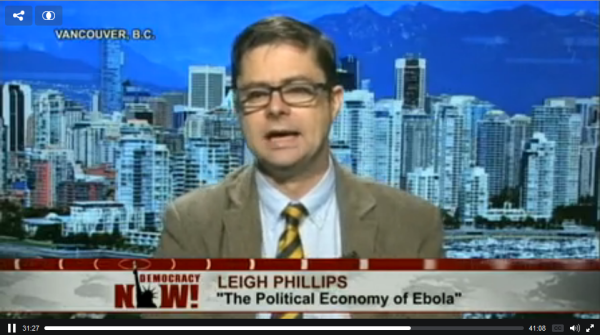We look at the political and economic circumstances of the spread of Ebola with science writer Leigh Phillips, who calls for a socialization of pharmaceutical research and production. Phillips says that using revenues from profitable drugs to subsidize research for unprofitable drugs would reduce the costs of vaccines and their development. He also argues the decimation of the healthcare infrastructure is linked to the same free market policies and austerity measures pushed by Western countries and the International Monetary Fund that impoverished the West African countries where the Ebola outbreak has occurred. “We need to begin to ask whether capitalism itself is not pathogenic,” says Phillips, whose recent article for Jacobin magazine is “The Political Economy of Ebola.”
Transcript
This is a rush transcript. Copy may not be in its final form.
AMY GOODMAN: We bring in Leigh Phillips now into this conversation—Michelle speaking to us from Atlanta. He’s a science writer and European Union affairs journalist. His writing has appeared in Nature, The Guardian, Scientific American. His recent piece for Jacobin is headlined “The Political Economy of Ebola.” What do you mean by this, “the political economy of Ebola,” Leigh Phillips?
LEIGH PHILLIPS: Well, I think we need to look at the political and economic circumstances, particularly around this particular disease both in the United States and Western countries in terms of the funding for research, where that’s coming from, and in terms of austerity in Europe, but also austerity in West Africa, as well. There’s sort of two prongs to this. The first, of course, was that, you know, over the last few months we’ve seen over and over again people from the CDC, senior figures from the WHO, even John Ashton, the head of the U.K. Faculty of Health, who have said, basically, that the knowledge is there, the know-how is there—we have five candidate vaccines, there’s a number of other different treatments that, you know, are well in hand—but there just hasn’t been any buy-in from the major pharmaceutical companies. John Ashton, as I was saying, from the U.K. Faculty of Health, you know, sort of the doctor-in-chief, if you will, in the U.K., described this as “the moral bankruptcy of capitalism.” It sounds, you know, quite vituperative there, quite explosive language, but it really expresses the anger that a lot of the researchers feel about how, look, we know what to do here, but this is just an unprofitable disease.
NERMEEN SHAIKH: So, could you elaborate, Leigh Phillips, on the point that you make in your article about why it is that pharmaceutical companies are more interested in funding medications that people have to take over a long term, rather than investing in one-off medicines like vaccines?
LEIGH PHILLIPS: It’s fairly straightforward, and it’s not—the argument is not that the major pharmaceutical companies are somehow evil or malevolent. This is just the way that the free market works. If Ebola, like many, many other unprofitable diseases, is something that—basically, if we’re going to resolve the situation, we’re going to basically cure it. We’re not going to handle it for the long term. We want something that—some drug or some vaccine or some treatment that people are going to take once, twice, maybe for a short period of time, but then that’s it. We don’t want to be dealing with this for the rest of—somebody doesn’t want to be dealing with this, obviously, for the rest of their lives.






